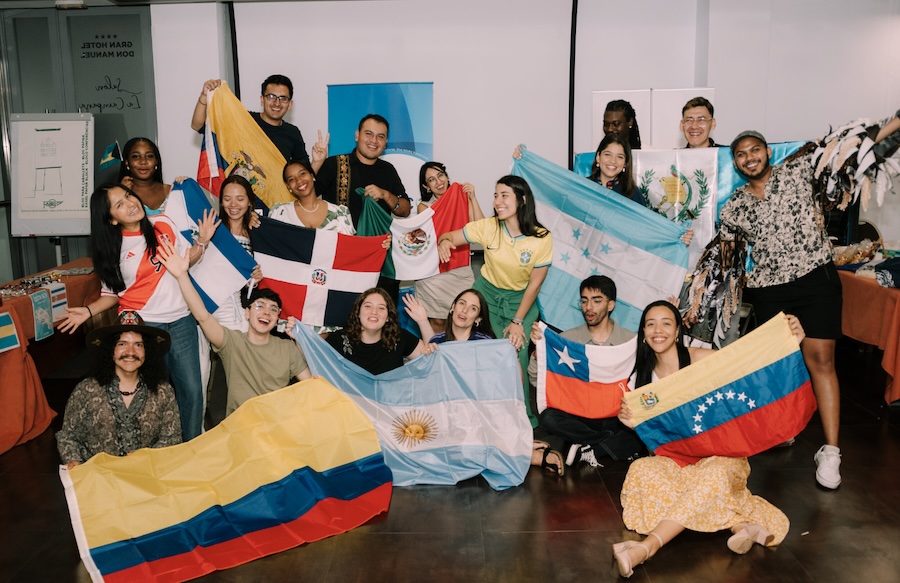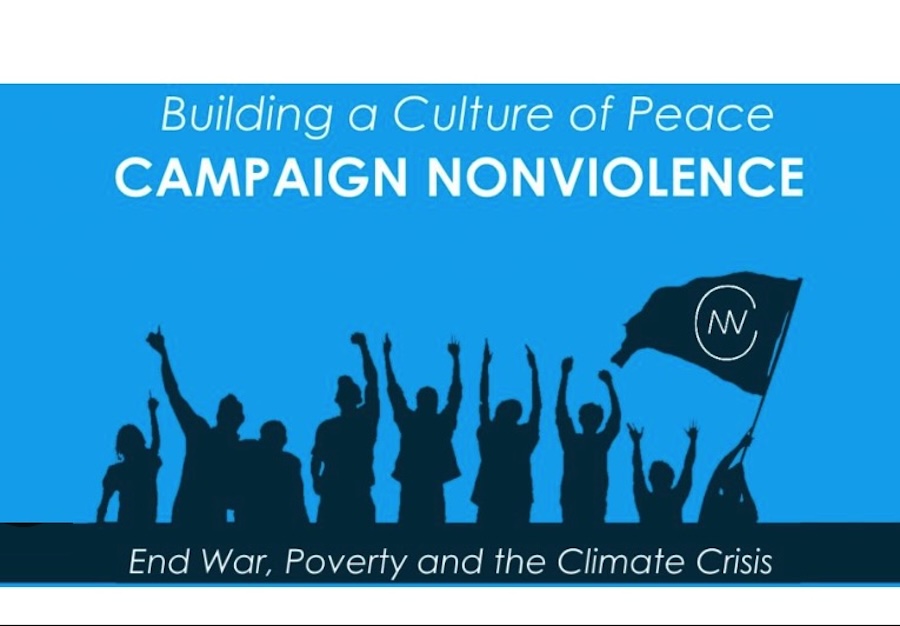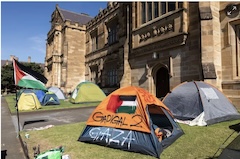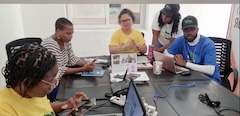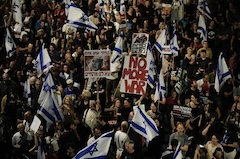DISARMAMENT AND SECURITY .
An article from Portside
Two hundred and sixty-eight days into Israel’s war with Hamas, thousands of Israelis queued at the entrance Tel Aviv’s Menora Mivtachim Arena on Monday night, waiting to enter an event called “It’s Time: The Great Peace Conference.” The rally was organized by a confederation of some 50 organizations and individuals from Israel’s left and pro-peace camp, with a message that revolved around the arena’s LED screens: “It’s time to reach a deal. To stop the war. To make peace.”

Thousands of attendees shine their lights in solidarity at ‘The Great Peace Conference’ in Tel Aviv, Israel, Monday, July 1. (Haaretz)
The attendees represented a mixture of organizations, from Peace Now and Breaking the Silence to the anti-judicial overhaul protest groups. Some wore shirts reading “Bring them home now,” a call for a deal to return the hostages to Israel; others depicted watermelons, a stand-in for the Palestinian flag, which Israel’s police largely prohibit waving. A group of high schoolers in hijabs toted iced coffees, and a man in red and yellow Buddhist monk robes climbed over the barriers into the orchestra section to greet friends.
The speaker lineup was similarly diverse. It featured Israelis who lost family to Hamas’ onslaught in southern Israel and Palestinians who lost family to Israeli air strikes in Gaza. A woman in a Jewish headscarf recited a prayer for mothers beside her friend, an observant Muslim, who repeated it in Arabic.
Screens on either side of the stage provided English, Arabic and Hebrew subtitles for the speakers, and sign language interpreters translated the Hebrew and Arabic as it was spoken. In one video presented to the crowd, former generals and security officials endorsed peace as the only viable path to safety; in another, Palestinians in the West Bank and East Jerusalem gave their blessing to the event.
“Our mutual goal here is many different organizations and movement is to build together a peace camp in Israel,” Alon-Lee Green, co-director of Standing Together, one of the groups that organized the conference, told Haaretz. “I’m not even saying to rebuild. I’m talking about building from this from the beginning – a peace camp that is grounded in reality. And in reality, millions of Palestinians are living under violent military control.
“Millions of Jews are living with no safety, not just in the south and the north; it is unsafe for people to imagine that they’ll keep living on this land. And in this reality, we also need to recognize the hegemony, and the hegemony is of the Israeli government, the Israeli military, and we must be able to look at it and to face it. So what we’re trying to do is to build a new camp in the Israeli society, a peace camp that is equal for Palestinians and Jews, and a peace camp that is courageous enough to not do the mistakes of the ones of the 90s and the beginning of the 2000s.”
Maoz Inon, whose parents were killed in the Hamas-led massacre on October 7, was one of the key organizers of the rally. “On my journey, I learned that hope isn’t something you lose, or something you find, or something that you wait for until it finds you. Hope is something you make,” he told the crowd.
Rula Hardal, a Palestinian from Peki’in who now lives in Ramallah, presented a dire forecast: She said that she and the Jewish activists she shared the stage with may have different opinions on particular issues, but they have a commonality. “We all share the same space between the Jordan River and the sea, that we, Palestinians and Israelis, Jews and Arabs, call a homeland,” she said “But this homeland is bleeding. Spirits of vengeance and bloodshed hover over it, and if we don’t stop it now, we’ll all be on the way to collective suicide.”
The event also made room for up-and-coming leadership, bringing young activists to the stage. One was Yanal Jabarin, a journalist from Jerusalem, who recounted his harrowing experience in January at a right-wing rally calling for the resettlement of Gaza.
He told Haaretz that this event is something of an antidote to the messaging coming from the far-right government. “In this show of force we have here, the thousands of people who came here, it doesn’t matter what your opinion is on ‘the day after,’ or whether you believe in two states or one, we just have to say that there’s a side that stands against all of this fascism and all of this racism and messages about transferring the Palestinian people anywhere.”
Another young leader was Josh Drill, an expat from New Jersey who found his way to activism after serving as an IDF officer in Hebron. “The amount of injustice and suffering from so many sides, and from so many different perspectives, really pushed me to understand that I’m going to be a part of this peace movement that’s going to change the reality on the ground,” he told Haaretz.
(article continued in right column)
Question related to this article:
How can a culture of peace be established in the Middle East?
(article continued from left column)
“We cannot accept this cycle of bloodshed, we cannot accept the current reality. It’s just not livable for anyone. And I think that the clear understanding that the Israelis and Palestinians are here to stay, no one is going anywhere. We need to understand how we can live amongst ourselves as Israelis, and also Israelis and Palestinians. Because if we don’t, the cycle of bloodshed will just continue and more lives will be lost.”
Elana Kaminka spoke of her son, Yannai, who was killed by Hamas terrorists on October 7 while protecting his soldiers as a platoon commander at the Zikim Base. “We have three more children, and the way that things are going now, and that people want to continue living in a consistent state of war, isn’t acceptable to us,” she said backstage. “We lost one son, we understand the pain that that involves. And for my other three children, I don’t accept that there’s no other option, that there’s no other alternative. I refuse to accept that, and I don’t accept it for Palestinians, and I don’t accept it for Israelis, we all deserve a better future.”
In speeches and private discussions, particular themes and messages reemerged. Both Israelis and Palestinians have a claim to the land, and must find ways to live with each other upon it; there must be a sea change in Israeli and Palestinian society’s perception of peace, security, self-determination and the other; enough of our parents, children and friends have died to this cycle of violence.
“War isn’t a law of nature – it is a human choice,” said Prof. Yuval Noah Harari n his keynote speech. “And at any moment, it is possible to make a different choice, and start to make peace. True, we have tried to make peace in the past, and we weren’t good at it. So what? We haven’t been that good at making war, either, which doesn’t prevent us from making another one, and another one. All these wars have led us to the abyss. It’s time to give peace another chance.”
Despite the roaring cheers of the crowd, something felt a bit empty. It is not the stadium, whose seats were almost fully booked, but perhaps the fact that it was in a stadium, an enclosed room, in the first place. The participants had all bought tickets; they were a choir being preached to. “It’s an event for us, to make us feel good,” one girl told another in the stairwell. “To make us feel like we’re on the right side.”
When asked about this, Jabarin said that it seems the organizers had already considered this aspect. “It’s going to be livestreamed and there’s a lot of media here, so any message spoken here will make its way to people around the world, not just in Israel, so it’ll have an impact.” And, he added, although the audience belongs mostly to the left, Israel’s left has long been fractured – something that has cost it elections.
“There’s a broad spectrum of people [here], between Balad voters for the most left-wing Palestinian, [Israeli leftist party] Hadash, even the National Unity Party and Benny Gantz. There’s a big chance that we have something in common, this whole audience. So it’s important for us to work together as a united community on ‘the day after’ and not argue over petty things, because that’s what we’ve been arguing over for 70 years. Now is the time, because we see that the other side is already organized. It knows what it wants. We also need to know what we want, and we need to work together.”
After about three hours of speakers and musical guests, the attendees started to make their ways out of the arena. Ibrahim Abu Ahmad, one of the hosts of the Third Narrative podcast, lingered to talk to friends. “I think it was sort of a support group to all of us to know that we’re not alone,” he said of the conference, which he described as beautiful and moving. “But maybe the next step will be to be in the masses, to not just say it in a closed auditorium, but to go and call it out on the streets to the entire country.”
He added that in the 1990s, about two thirds of both the Israeli and Palestinian populations believed in peace – but that fraction is down to less than a third. “We need to continue and push it more and more and more,” he said.
“I always say that these people didn’t vanish, they didn’t all die, they didn’t disappear. They lost hope. And if they lost hope, they can regain hope, and new people can also gain hope. And that happened right after the First Intifada, when everybody thought that there was never going to be peace out of nowhere. Somehow, we started to talk about peace. So we can do that again,” Abu Ahmad said.
“But maybe this time, not to let the extremists take control because back then they did everything they can to prevent peace. And unfortunately, they succeeded. We saw the worst terror attacks at the time in the 90s during Oslo and you know, one radical Israeli killed the Israeli prime minister. Peace died, then we can’t let that happen again.”
– – – – – –
If you wish to make a comment on this article, you may write to coordinator@cpnn-world.org with the title “Comment on (name of article)” and we will put your comment on line. Because of the flood of spam, we have discontinued the direct application of comments.
